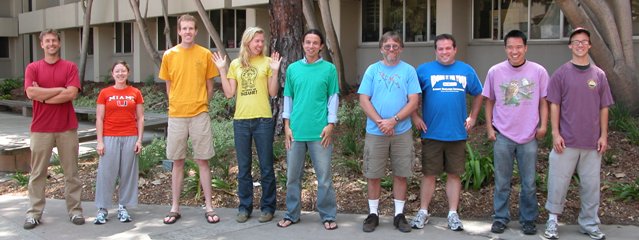(Preliminary comments) Welcome, students, family, and friends, to the Geography Department Graduation Ceremony. I am Dar Roberts, Chair of the Department. I am very pleased to have the opportunity to honor the Graduating class of 2013. Before we get started, I’d like to take a moment and recognize some of the Geography Faculty members with us today. (Introduction of faculty present) As many of you may know, the Geography Department at UCSB is nationally ranked 1 or 2, depending on how you query the data. This ranking is due to the truly outstanding faculty members we have in the department. Now, let’s proceed to honoring our amazing students.
Graduating from college is something I am sure all of us remember well. For students, graduation represents the end of one part of your life that started in kindergarten; extended through grammar school, high school, and, finally, college; and is the beginning of another that will ultimately lead to a career.
It has probably been a long, but very interesting road, with many adventures on the way, a few wrong turns, some great choices, and also a few lucky ones. Your decision to come to UCSB and earn a degree in Geography was a good one.
For some of you, this degree is likely to represent the end of 16 years of school and the start of a new road and a new career. If that is the case, we wish you the best of luck, and hope we have given you a great start with training in Geography. Personally, I can imagine few better choices for a degree. Society is faced with an increasing number of challenges, from environmental pollution, such as the gulf oil spill and lingering oil in wetlands, to natural disasters, such as the massive Japanese earthquake and tsunami, to global warming and efforts to reduce CO2 emissions and improve our lives by designing healthier, more energy efficient cities and neighborhoods. Smart phones allow us to navigate even the most challenging cities, and we can routinely watch our world change through the eyes of Google Earth. In each of these examples, a Geography degree contributes, and the jobs will be there.
For those of you who plan on continuing along an academic path (and more school), the road continues on, but it will change. Each step we take along the path of education becomes more challenging and more rewarding. One of your greatest challenges, as you will discover, is figuring out what your research question is. However, rest assured that the world is full of interesting and important research questions, and you will find one, and I suspect it will be a good one. When I look at the kinds of research our graduate and undergraduates do today, it just blows me away. I can’t wait to see what kinds of questions this class will ask and the problems you will solve.
You have not traveled this road alone. First and foremost, you had your parents, who supported you, pushed you at every stage of your education, and probably did a fair amount of laundry. I am sure every one of them is immensely proud of you today. Secondly, you had your friends. One of the most special things about college is the friends you make and the experiences you share. My memories of college include many long nights of study, too much bad coffee or Mountain Dew, incredible field trips camping under the stars, and lots of friends who were there with me at every stage. Thanks to applications like Facebook, many of us are rediscovering each other.
Finally, you had your professors, TAs, and other advisors. Some of the people who influenced me the most were my teachers. I suspect you can say the same.
While we honor many students today, I want to acknowledge all of the students who are graduating. This year’s class of Geography majors includes 50 students, 3 of whom have earned the Bachelor of Science degree, 18 with a Bachelor of Arts with a GIS Emphasis degree, and 29 who have earned the Bachelor of Arts degree. Ten of these have been awarded the Outstanding Achievement in the Geography Major Award and 2 of them the Distinction in the Major Award. (Breakdown of degree candidates) With that, let’s give out some awards. (Award certificates presented; also see the previous June 20 article about the reception and the June 6 article, “2013 End of Year Student Awards”)



